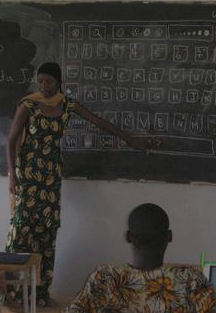More Tech Salons About Youth Employment
-
We’re witnessing the most rapid job displacement in human history, and the development community is dangerously unprepared for what’s coming next. At the Technology Salon NYC – UNGA Edition a participant wondered: “When someone quits, should we hire another? Or do you feel you can use AI enough now that you don’t need to replace…
-
Digital technology is transforming economies and the world of work in profound ways. Traditional jobs are being transformed while new forms of work are being created. Siven Maslamoney, Manager, Harambee Youth Employment Accelerator, and Sean Blagsvedt, Former CEO of Babajob.com in India, led the group of digital professionals, M&E officials and youth facing programme implementers…
-
Migration is central to the current political debate as well as to the development discussion, especially in conversations about the “post 2015” agenda, the ‘youth bulge’, and youth employment. Prevention work is not likely to end migration, regardless of the organizations and governments working to improve the well-being of children and youth in their home…
-
At the Technology Salon on “How Can We Create Digital Jobs for African Youth?” our discussion was led by Lauren Dawes, who leads the GSMA’s Mobiles for Employment team, and Lillian Chege from the Rockefeller Foundation’s Digital Jobs Africa program. The GSMA will release a study on Mobiles for Youth Employment in July, and Rockefeller…
-
At the recent Technology Salon on African-Led Mobile Innovation in Congo Brazzaville, we welcomed Verone Mankou, the head of VMK, a company in Congo Brazzaville that designs and produces the Way-C Tablet and the Elikia smart phone. The event was graciously hosted by ThoughtWorks, and Verone’s US trip was organized by Senam Beheton of EtriLabs.
-
The March NYC Technology Salon offered an opportunity to discuss how mobile technology can transform workforce development and to hear how mobile is improving the reach and impact of existing initiatives working with girls and young women.
-
The November 14, 2012, Technology Salon NYC focused on ways that ICTs can support work with children who migrate. Our lead discussants were: Sarah Engebretsen and Kate Barker from Population Council, and Brian Root and Enrique Piraces from Human Rights Watch. This post summarizes discussions that surfaced around the Population Council’s upcoming Girls on the…
-
At the global level, a very small percentage of development funding goes to urban spaces, yet hard-hitting issues impact many of the urban poor: lack of tenure, lack of legality of land, informal settlements, lack of birth registration and civil registration in general, waste disposal, clean water, politicizing of local authorities and more. Can new…
-
Let us start by agreeing that technology has great promise in increasing the economic empowerment of youth in the developing world. We all believe it. But what is that promise in reality? Which technologies hold greater promise? What innovations work? That was the issue we discussed at the Technology Salon on Youth Economic Empowerment with…
-
Today’s youth population is the largest in the history of the world, and 90% of these young people live in developing countries. The global youth unemployment rate is the highest on record, and we’re seeing discontent and disenfranchisement play out on the news each day. In fact, the revolution in Tunisia started with an under-employed…
-
The Girls and ICT Technology Salon was a great opportunity to get an amazing group of thinkers and do-ers in the same room to debate around a particular topic. I’m Linda Raftree, Plan International West Africa Regional Office, Advisor for New Technology and Social Media. I was honored to lead 20+ people in a conversation…
-
In the developing world, girls need new skills and capacities for the 21st Century. They need to have the ability to be flexible, adaptive, and innovative to grow into positions of influence in their communities and countries.
Yet – as we learned in the Gender Equality in ICT Education discussion – just getting girls to secondary school is a challenge, and once there, girls often shun ICT’s unless they have strong mentors and female role models.
Please join us Thursday, January 28th, as Linda Raftree, Social Media and New Technology Advisor for Plan International‘s West Africa Regional Office, leads us in a discussion of three pertinent questions:
- How can the technology and international development communities support the development of girls?
- What role does ICT play in facilitating girls’ growth?
- And where are the concrete examples that prove ICT is a net positive for female progress?
We’ll also try to identify case studies, partners, and further research around girls development and ICT for inclusion in Plan’s 2010 Girls and ICT Report, now underway.












